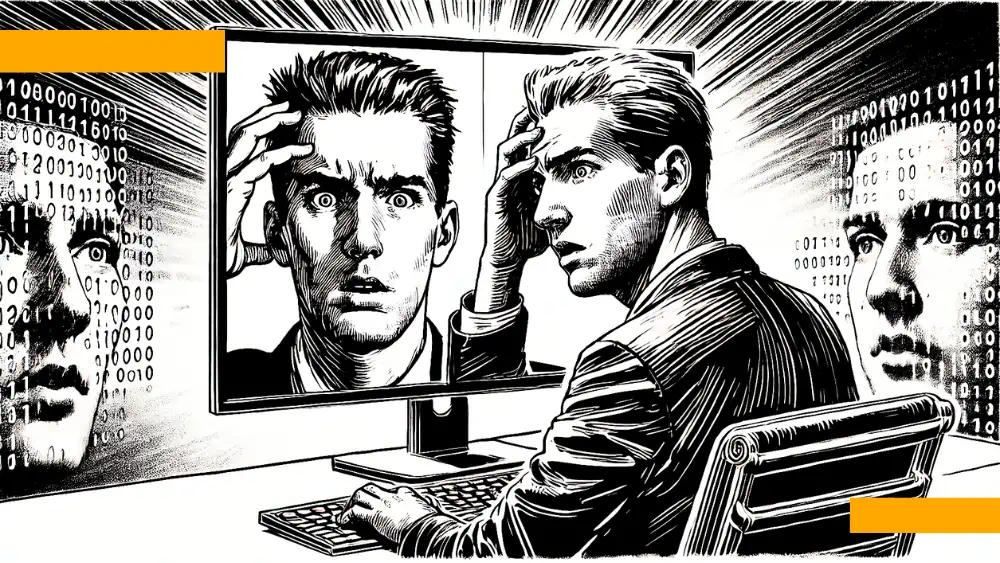 illustration: DALL-E
illustration: DALL-EResearchers Qiang Liu, Lin Wang, and Mengyu Luo from the University of Science and Technology in Shanghai set out to examine how deepfake technology affects the perception of information and users` trust in media. In their article When Seeing Is Not Believing: Self-efficacy and Cynicism in the Era of Intelligent Media, published in Humanities and Social Sciences Communications, they conducted two experiments involving 1,826 participants, analyzing how cynicism toward information changes depending on users` ability to recognize AI-generated content.
The experiments revealed that:
- Individuals with low self-assessment in recognizing AI content are more likely to question the authenticity of news that is personally significant to them.
- Low-risk content paradoxically raises more skepticism than content considered high-risk.
- Users who repeatedly struggle to assess the authenticity of deepfakes lose confidence in their abilities and abandon efforts to verify information.
This phenomenon leads to the so-called "apathetic reality," where audiences choose indifference over critical thinking regarding media consumption.
Why Are We Losing Trust in Media?
The growing cynicism toward AI-generated information is not just a technological issue but also a matter of how audiences process content. Research suggests that users engage more in content analysis when they feel the topic directly affects them.
Data shows that:
| Factor | Impact on AI Self-Assessment | Impact on Cynicism |
|---|---|---|
| High content relevance | Increased confidence | Reduced cynicism |
| Low content relevance | Decreased confidence | Increased cynicism |
| High-risk news | Greater inclination to verify | Lower level of cynicism |
| Low-risk news | Less interest in verification | Higher level of cynicism |
The study`s authors highlight the effect of cognitive fatigue. When users repeatedly encounter situations where they cannot distinguish deepfakes from real content, they stop making an effort to check. Ultimately, instead of verifying authenticity, they begin treating all information as potentially unreliable.
What Can We Do?
Experts emphasize that the solution lies not only in developing deepfake detection technologies but also in shaping new media literacy models.
- Social media platforms should implement more advanced mechanisms for labeling AI-generated content.
- Users should be trained not only in recognizing fake news but also in consciously processing information in an era of informational chaos.
- Journalists should make greater use of content verification tools and build communication strategies based on source transparency.
Liu, Wang, and Luo`s study found that even a small increase in users` self-confidence regarding AI leads to a significant reduction in cynicism and greater engagement in content analysis. This means that education and tools supporting content verification can help audiences regain control over what they consider true.
The Future of Trust in Information
Deepfake news is a challenge we will face for years to come. In the age of artificial intelligence, it is not just technology that determines what we believe but also our ability to recognize and critically analyze content. If we do not begin developing skills to navigate the world of synthetic information, we may find ourselves in a reality where we cannot even trust what we see with our own eyes.
* * *
Article by Liu, Q., Wang, L., Luo, M. (2025) When Seeing Is Not Believing: Self-efficacy and Cynicism in the Era of Intelligent Media, published in Nature Humanities and Social Sciences Communications, available at
https://www.nature.com/articles/s41599-025-04594-5
COMMERCIAL BREAK
New articles in section Media industry
Children and communication with machines. Experiment by SWPS researchers
SWPS
How do primary school students treat humanoid robots? Researchers from SWPS University have shown that in most cases, children relate to robots politely, and younger children and girls more often perceive them as possessing human characteristics.
Streaming platforms in Poland. What criteria determine the choice
Paweł Sobczak
Price, indicated by 54.2% of respondents, and subject matter (54% of indications) are the most important factors influencing users' choice of content on streaming services. The service brand is mentioned by 18.1% of those surveyed.
Yellow Badge. Jan Bluz's documentary on political prisoners in Belarus
BARD
Imagine writing three posts on a social networking site. For a few clicks on a keyboard, you get three years in a penal colony. Sounds like a grim joke? For political prisoners in Belarus, this is the reality that Jan Bluz shows in the documentary "Yellow Badge", produced with the support of the Pulitzer Center.
See articles on a similar topic:
DAB+ Radio. What is Digital Radio Broadcasting?
Krzysztof Fiedorek
Digital radio broadcasting technology, compared to traditional analog radio, provides higher sound quality, better resistance to interference, and more additional features during transmission. However, it’s not without drawbacks and raises concerns among broadcasters.
Digital Newspapers in Poland
Bartłomiej Dwornik
The three largest distributors of digital press editions in Poland sell around 270,000 e-magazine copies monthly, according to Money.pl analysis. Digital press is mostly read by experienced internet users, managers, and emigrants.
The most valuable female personal brands in Polish fashion. IMM report
KFi
The ten most popular people in Poland in the "fashion" category generate over 1.5 billion contacts across all types of media in a year. Their value is nearly 400 million zlotys. The ranking was prepared by the Institute of Media Monitoring for "Forbes Women" magazine.
Gen Alpha avoids tough topics. What young people are really looking for
Krzysztof Fiedorek
Generation Alpha prefers humor in 46% of cases, while only 12% are interested in news and political topics. Young people and children consciously limit what negatively affects their emotions - according to the report "Gen Alpha Unfiltered" published by GWI.






























